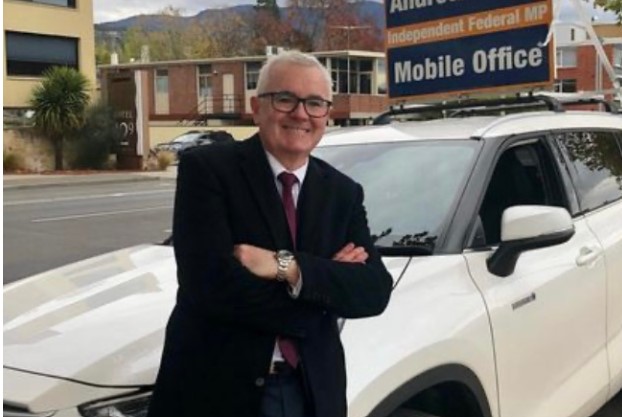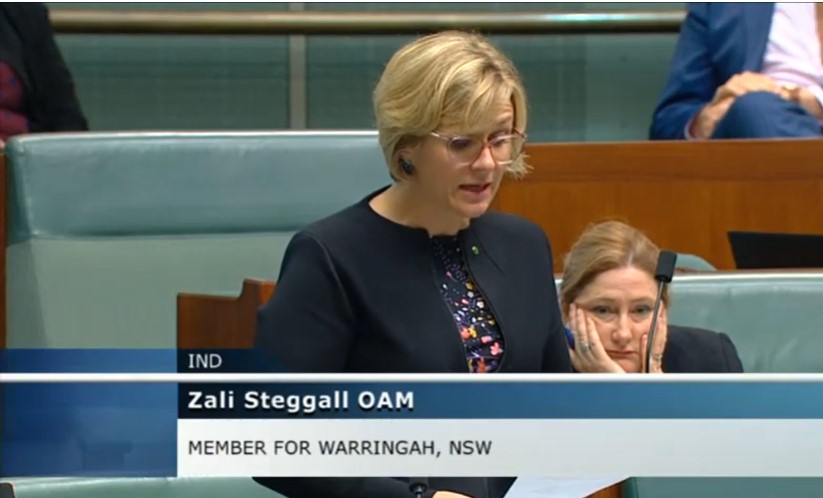The independent Member for the federal electorate of Clark, Andrew Wilkie, has continued his long-term campaign to reform political donations in the House of Representatives this week.

By Jacquelene Pearson
Independent MP Andrew Wilkie has reintroduced the Commonwealth Electoral Amendment (Cleaning up Political Donations) Bill to the House of Representatives on Monday, February 13.
“When I tabled a similar bill in 2022 it received no support from either major party which, while shameful, was unsurprising when you look at the vast wads of cash the major parties received in the last financial year,” Wilkie told the House.
“The community is demanding political donation reform, and many people were dismayed that the earlier version of this bill was not supported by the government and the opposition,” he said.
“This time around, the major parties must put self-interest aside and support the bill.”
He pointed to the Australian Electoral Commission data released recently, stating the analysis showed that “an absurd amount of money continues to flow to political parties and candidates, often by big corporate entities”.
According to Wilkie those massive donations are made worse by “lax legislation which ensures the public doesn’t know where much of that money came from”.
He said the current threshold of $15,200 for disclosing political donations was too high and there should be a requirement that forces donors to disclose when they make multiple donations just below that threshold.
“A gambling company can donate $15,199, one dollar below the threshold, on multiple occasions without the public ever knowing about it,” Mr Wilkie said. “No wonder dark money, that’s money with no identifiable source, reached a record-breaking $119 million last year, or some 40 per cent of political party revenue.”
Wilkie’s Bill would drop the disclosure threshold to $1,000 and require disclosure of multiple donations from the same source if the total is over the threshold.
It would also require real-time disclosure of donations instead of the annual disclosures that are currently required.
“At present up to 19 months can pass between receiving a donation and the public becoming aware of it. So, for example, Australians went to the ballot box last May oblivious to the fact that the Minerals Council gave over $100,000 to the Labor Party, and Adani gave almost $110,000 to the Queensland LNP,” Wilkie said.
“To remedy this the Bill requires political entities to provide a return to the AEC within two business days of receiving a donation over $1,000. The AEC must then publish the information on its website as soon as reasonably practical.
“If this bill had been enacted before the last election, Australians would have known that one of the biggest online sports gambling companies, Sportsbet, donated $278,000 to the three major parties during the last financial year or that Star Entertainment Group, which notably was found unfit to hold a gambling licence in NSW and Queensland, donated $212,000.
“Surely voters have a right to know who has bankrolled a candidate or party before casting their vote, because the reality is that government policy is overwhelming shaped by political donations. How else do you explain sluggish action by the government and alternative government on critical issues such as climate change or gambling reform?”
Wilkie said he had no doubt that the reluctance of both Labor and the Coalition to “pursue meaningful reform on climate change” had been influenced by the enormous amounts of money received from the fossil fuel industry.
He also wants to stop politicians and political parties from being able to accept donations from industries that cause “direct harm to Australians”.
“That’s why the bill prohibits donations from fossil fuel companies, gambling companies, liquor companies and the tobacco industry. It also increases penalties for corporations who breach electoral laws.”
Wilkie’s bill would see a cap of $50,000 placed on the total amount any one donor could donate during an electoral cycle and would cap the total amount candidates and parties can spend on election campaigns.
Finally, it would expand the definition of a ‘gift’ to include payments or activities worth over $1000 that materially benefit a party or candidate including money spent to attend fundraisers and functions.
“Politicians should be elected on their policies, their values and what they can offer their community, not on who has the biggest war chest,” Wilkie said.
Another independent, the Member for Mayo, Rebekha Sharkie, seconded Mr Wilkie’s Bill.
Sharkie said: “We now have a federal ICAC. Political donations must be the next thing we all do in this place to clean up the perception the Australian community has of us.
“This bill would allow the Australian public to see, in real time, in two business days, who is bankrolling their elected representatives by making donations of more than $1,000. I would just like to stand here and say that I have made a commitment to my community that I will not receive any large donations—no donations over $1,000,” she said.
The Point has asked local federal parliamentarians, Member for Robertson, Dr Gordon Reid, Member for Dobell, Emma McBride and Senator Deborah O’Neill for their responses to the Wilkie Bill. We will report responses as they are received.


